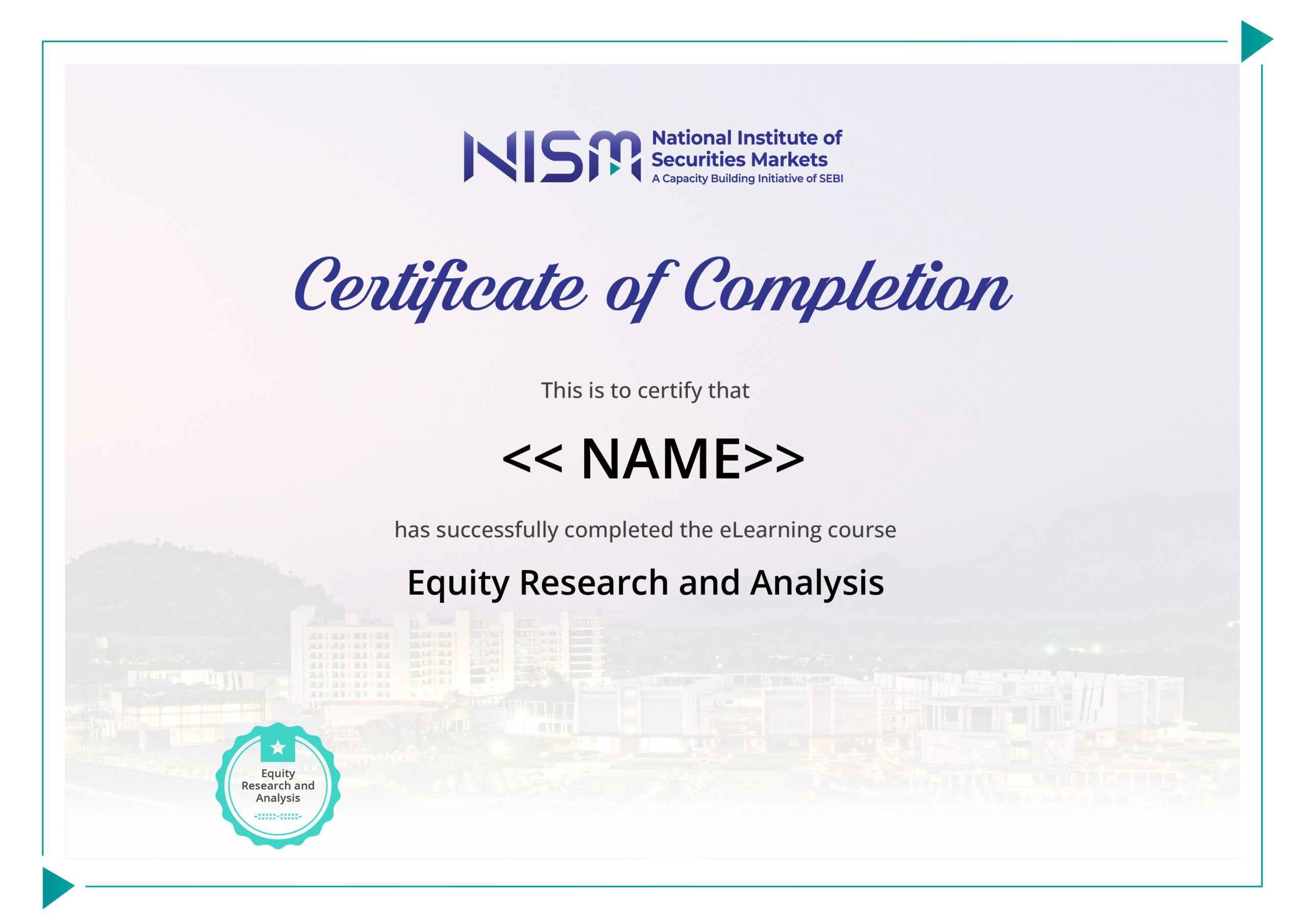About the course
The Equity Research and Analysis Course is designed to empower learners with the skills and knowledge required to excel as research analysts in the financial markets.
The course offers comprehensive coverage of key topics, including:
- An overview of the Indian securities markets
- Fundamental and advanced research methodologies
- Macro and microeconomic analysis for market insights
- In-depth company analysis and valuation techniques
- Understanding risk, returns, and corporate actions
- Regulatory frameworks and professional research report writing
By the end of the course, learners equipped with a solid foundation to thrive in securities market
analysis and drive professional success
Who should take this course
This course is ideal for individuals seeking to understand the core principles of equity research and
analysis in a concise, structured format. The course is designed to build the capacity of
- Aspiring Research Analysts
- Finance Professionals and Investors
- Financial Advisors and Wealth Managers
- Individual Investors and Traders
- Students aspiring for a career in Securities Markets
Learning Mode
- The Course is designed in an e-Learning mode and the working executives can complete this at
their own pace. - Combination of approximately 3 hours of online training programme, split into convenient
13 modules including videos and assessment. - Access to course content will be valid for a period of 1 month from the date of registration.
Course Modules
| S No. | Modules | Topics |
|---|---|---|
| 1 | Introduction to Research Analyst Profession | • Primary role of research analyst • Primary responsibilities of research analyst • Basic principles of interaction with companies and clients • Important Qualities of a research Analyst |
| 2 | Introduction to Securities Market | • Introduction to Securities and Securities Market • Product Definitions / Terminology • Structure of Securities Market • Various market principals and their activities • Kinds of transaction • Dematerialization and rematerialization of securities |
| 3 | Terminology in Equity and Debt Markets | • Terminology in Equity Market • Terminology in Debt Market • Types of Bonds |
| 4 | Fundamentals of Research | • What is Investing? • The role of research in investment activity • Technical Analysis • Fundamental Analysis • Quantitative Research • Behavioural Approach to Equity Investing |
| 5 | Economic Analysis | • Basic Principles of Microeconomics • Basic Principles of Macroeconomics • Introduction to Various Macroeconomic Variables • Role of economic analysis in fundamental analysis • Secular, cyclical and seasonal trends • Sources of Information for Economic Analysis |
| 6 | Industry Analysis | • Role of industry analysis in fundamental analysis • Defining the industry • Understanding industry cyclicality • Market sizing and trend analysis • Secular trends, value migration and business life cycle • Understanding the industry landscape • Key Industry Drivers and Industry KPIs • Regulatory environment/framework • Taxation • Sources of information for industry analysis |
| 7 | Company Analysis – Business and Governance | • Role of company analysis in fundamental research • Understand Business and Business Models • Pricing Power and Sustainability of This Power • Competitive Advantages/Points of differentiation over the Competitors • Strengths, Weaknesses, Opportunities and Threats (SWOT) Analysis • Quality of Management and Governance • Structure • Risks in the Business • History of credit rating • ESG framework for company analysis • Sources of Information for Analysis |
| 8 | Company Analysis – Financial Analysis | • Introduction to financial statement • Stand-alone financial statement and consolidated financial statement • Balance Sheet • Basics of Profit and Loss Account (P/L) • Statement of changes in shareholder’s equity • Basics of Cash Flows • Notes to accounts • Important Points to Keep in Mind While Looking at Financials • Reading audit report to understand the quality of accounting • Financial statement analysis using ratios • Commonly used ratios • Dupont analysis • Forecasting using ratio analysis • Peer Comparison • Other aspects to study from financial reports |
| 9 | Corporate Actions | • Philosophy of Corporate Actions • Dividend • Rights Issue • Bonus Issue • Stock Split • Share Consolidation • Merger and Acquisition • Demerger / Spin-off • Scheme of arrangement • Loan Restructuring • Buyback of Shares • Delisting and relisting of Shares • Share Swap |
| 10 | Valuation Principles | • Difference between Price and Value • Why Valuations are required • Sources of Value in a Business – Earnings and Assets • Approaches to valuation • Discounted Cash Flows Model for Business Valuation • Relative valuation • Earnings Based Valuation Matrices • Assets based Valuation Matrices • Relative Valuations – Trading and Transaction Multiples • Sum-Of-The-Parts (SOTP) Valuation • Other Valuation Parameters in New Age Economy and Businesses • Capital Asset Pricing Model • Objectivity of Valuations • Some Important Considerations in the Context of Business Valuation |
| 11 | Fundamentals of Risk and Return | • Concept of Return of Investment and Return on Investment • Calculation of Simple, Annualized and Compounded Returns • Risks in Investments • Measuring risk • Concepts of Market Risk (Beta) • Sensitivity Analysis to Assumptions • Concept of Margin of Safety • Comparison of Equity Returns with Bond Returns • Calculating risk adjusted returns • Basic Behavioural Biases Influencing Investments • Some Pearls of Wisdom from Investment Gurus across the World • Measuring liquidity of equity shares |
| 12 | Qualities of A Good Research Report | • Qualities of a Good Research Report • Checklist Based Approach to the Research Reports • A Sample Checklist for Investment Research Reports |
| 13 | Legal and Regulatory Environment | • Regulatory infrastructure in Financial Markets • Important regulations in Indian Securities Market • Code of Conduct for Research Analysts • Management of Conflicts of Interest and Disclosure Requirements for Research Analysts • Exchange surveillance mechanisms: GSM and ASM |
Assessment and Course Completion
After finishing the course modules, participants will be
required to take a quiz to assess their comprehension. Those
who achieve a score of over 60% will receive a certificate of
completion.

Course Fee
The course fee is Rs. 1200 plus applicable taxes per candidate.
Please note that the course fee, once paid, is non-refundable under any circumstances.
FAQs
1. How to register for the course?
To register for the course, click on the register button on the top right corner, next to FAQs.
2. How to pay the course fee?
There is course fee. The course fee is INR 1200 plus applicable taxes.
3. What is the duration of the course?
The course has approximately 3 hours learning hours of content.
4. What is the access period for the course?
You will get access to the course content for 1 month from the date of your registration.
5. What if I am unable to complete the course within 1 month?
If you are not able to complete the course within the access period of 1 month, you can re-register for the course and start from the beginning.
6. Can I access the content in my mobile?
Yes, the course can be accessed through the mobile devices.
7. Can I download the content?
No, it cannot be downloaded.
8. Is there any proctored examination for this course?
No. However, there will be an end course MCQ type assessment.
9. Are there any passing criteria for this assessment?
Yes. Those who achieve a score of over 60% will receive a certificate of completion.
10. How will I get my certificate?
After successfully completing the course, you will be able to download the course Certificate.
11. How to get more information regarding this course?
For more information you can download the course prospectus, email elearning@nism.ac.in or call 02192-668492/93


